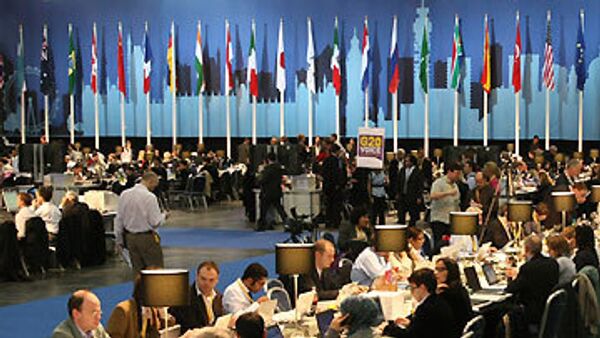MOSCOW. (Alexander Mirchev for RIA Novosti) - The emerging structure for a new international economic system reflects the significant challenges posed by current conditions, which have yet to settle on a comprehensive solution.
The joint efforts to prevent a catastrophic scenario of the financial crisis have achieved certain results. During the Pittsburgh summit, it was agreed that the G20 format, that includes the economies that make up 85% of world GDP, would take on a greater role.
A decision was also made to develop a framework strategic agreement on sustainable and balanced growth as well as on member states' cooperation to improve the coordination of fiscal, currency, trade, and structural policies based on more sustainable and balanced growth projections.
It was agreed that the International Monetary Fund and the newly established Council on Financial Stability would monitor national economies, primarily focusing on the G20 nations.
While clearly positive, the decisions made at the Pittsburgh summit represent a declaration of intention only, and need to be backed with practical implementation mechanisms. Based on these decisions, it is now necessary to build a system of cooperation for the period that the anti-crisis programs wind down. In other words, it is necessary to develop practical mechanisms for international cooperation on monetary, credit, budget, and financial policies.
The rapidly growing countries like China, Russia, India, and Brazil will play a significant role in developing the G20 into a full-fledged format for economic cooperation. They rightfully claim a greater influence in the decisions, shaping the future of the global economic and financial system, including the allocation of resources for international financial organizations.
It is still unclear whether the G20 will evolve into a new forum for the international economic cooperation. The G20 format may indeed allow the major economic powers to coordinate their policies. What should not be ignored, however, is that 85% of the world's nations are not G20 members and therefore have no say in this format.
Additionally, the G8 format continues to exist. Some analysts also mention other groupings such as G2 (the U.S. and China) and G3 (the U.S., China, and the EU), which include the world's largest economies and, consequently, shape the future of the world economy and the geopolitical balance of power.
The global crisis prompted the revision of existing international financial and economic architecture. The system of regulating and governing the global economic processes that has existed for the last 30 years, no longer meets the requirements of the present day. However, a new system has not fully emerged yet, and its effectiveness has yet to be tested in practice. There are still many hurdles to overcome in the process of its development.
Alexander Mirchev is president of Krull Corporation, and international expert on development strategies.
The opinions expressed in this article are the author's and do not necessarily represent those of RIA Novosti.



